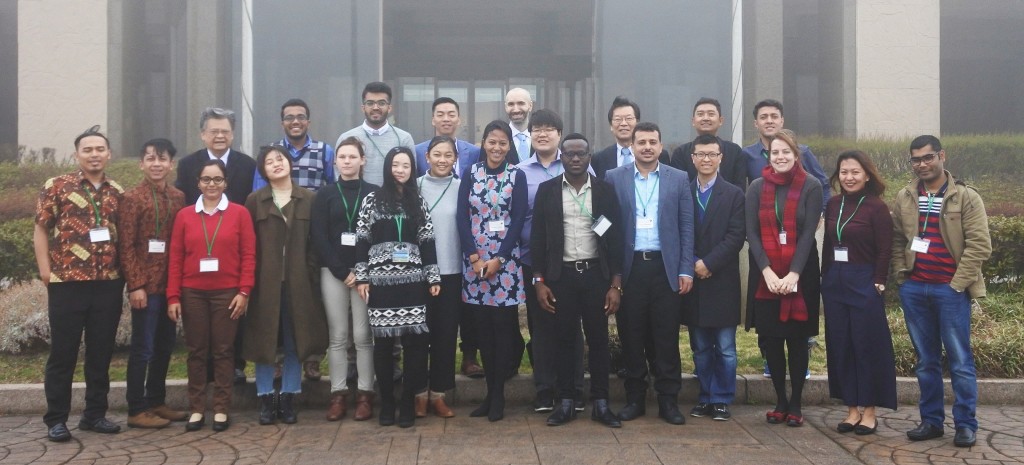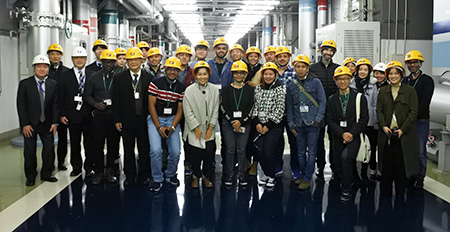 Twenty students from 18 universities from around the Asia-Pacific region from 15 countries recently spent one week in Japan for the 2018 ProSPER.Net Young Researchers’ School (YRS), learning about the theme ‘Sustainable Urban Development for the World’s Megacities’.
Twenty students from 18 universities from around the Asia-Pacific region from 15 countries recently spent one week in Japan for the 2018 ProSPER.Net Young Researchers’ School (YRS), learning about the theme ‘Sustainable Urban Development for the World’s Megacities’.
Held from 4-11 March, 2018 in Kanagawa, Japan, not far from the world’s largest megacity, Tokyo, the YRS provided graduate students with the opportunity to engage with issues related to sustainable urban development in the context of planning and policy making within megacities. As the world becomes more urbanised, cities – in particular megacities – have a key role to play in achieving the Sustainable Development Goals (SDGs).
The programme consisted of a series of lectures, delivered by both local and international experts in the field on a range of topics including urban transportation systems, waste management, urban water security, urban climate change mitigation and adaptation, urban disaster risk reduction and urban metabolism.
Additional workshops focused on developing research and communication skills, with participants learning about the art of developing research proposals, as well as a session covering effective research communication. Students were also able to develop their presentation skills with the 3-minute thesis competition, which challenged participants to present their thesis in just three minutes, testing their ability to explain their research to a non-specialist audience in a succinct and engaging way. Vishanthini Kanasan (Universiti Sains Malaysia) was awarded first place, with Sonya Kozak (Griffith University) and Swati Singh (TERI School of Advanced Studies) taking out 1st runner up and 2nd runner up respectively.
An interactive session, ‘Life after PhD’, provided students with an opportunity to hear from a panel of experts and researchers as they shared their stories about the pathways they have taken, allowing students to learn about the many different avenues available to them. This was followed by a Q&A session, giving the students further insights into a career within academia.
Mid-way through the programme, students spent a day visiting Yokohama, Japan’s second largest city and home to 3.7 million people, as part of a field trip for the YRS. As a port city with a history of international trade, Yokohama is a leader in smart city projects and has thus been designated as a ‘Future City’.
Students spent some time in the Minato Mirai area, learning about the government’s initiatives to make the city of Yokohama sustainable, as well as the challenges it faces in trying to reach this goal, such as the declining birth rate, ageing population, and deterioration of urban infrastructure. The city is currently working on two plans: The Yokohama City Action Plan for Climate Change Countermeasures, focused on decarbonisation and targets related to the Paris Agreement, and the Yokohama City Future City Plan, which considers the Sustainable Development Goals (SDGs), introducing initiatives to address simultaneous solutions related to the environment, economy, and society.
Other efforts towards becoming a Smart City that the city is currently working on include the construction of a virtual power plant to provide flexibility in energy management, as well as the utilisation of hydrogen as an energy source.
 The field trip continued with a tour of the Minato Mirai 21 District Heating & Cooling facility, which supplies heating and cooling facilities for businesses and residents across the district, 24 hours a day, 365 days a year. By centralising the equipment and operating on an area basis, the facility is able to respond to fluctuating energy demand and thereby operate with efficiency, producing energy savings. This not only benefits customers, but the city as a whole. In addition, by operating centrally, the facility contributes to disaster prevention, with the risk of a secondary disaster lowered by removing heat source equipment from individual buildings.
The field trip continued with a tour of the Minato Mirai 21 District Heating & Cooling facility, which supplies heating and cooling facilities for businesses and residents across the district, 24 hours a day, 365 days a year. By centralising the equipment and operating on an area basis, the facility is able to respond to fluctuating energy demand and thereby operate with efficiency, producing energy savings. This not only benefits customers, but the city as a whole. In addition, by operating centrally, the facility contributes to disaster prevention, with the risk of a secondary disaster lowered by removing heat source equipment from individual buildings.
A visit to a sludge treatment centre enabled the students to learn about the roles of the sewage system and how to maximise its energy. The sludge treatment process was explained, including how sewage water is treated, as well as how to effectively utilise and re-use resources and energy generated by the process.
The last stop on the field trip was to the Tsurumi Plant, where students learned about how the city is dealing with waste management. Initiatives to respond to the growing amount of waste include raising citizens’ awareness and educating children through school visits, seminars and outreach programs on the categories of disposal, addressing wastage of food in restaurants and homes (such as providing recipes for leftovers), and providing waste collection assistance for the elderly and less-abled members of the community. Students were also taken on a tour of the plant, observing the many stages of waste incineration, including the disposal of waste from garbage trucks, which acts as the fuel for the incinerators, and learning about the disposal of the resulting ash, the treatment of exhaust-gas, and the electricity generated by the process, via steam turbines.
The programme concluded with students presenting summaries of the week’s lectures, followed by presentations of group research proposals on the themes of Governance for Sustainable Development in Megacities, Urban Ecosystems in Megacities, Housing and Infrastructure in Megacities, and Urban Planning in Megacities. Each presentation outlined a research question, goals and objectives, methodologies, data sources, a timeline, and expected outcomes and deliverables. These served as a basis for project proposals within the aforementioned themes, in the context of creating sustainable megacities in an era of rapid urbanisation the world currently faces, and will continue to experience.
Outcomes from the 2018 ProSPER.Net Young Researchers’ School can be accessed here.
